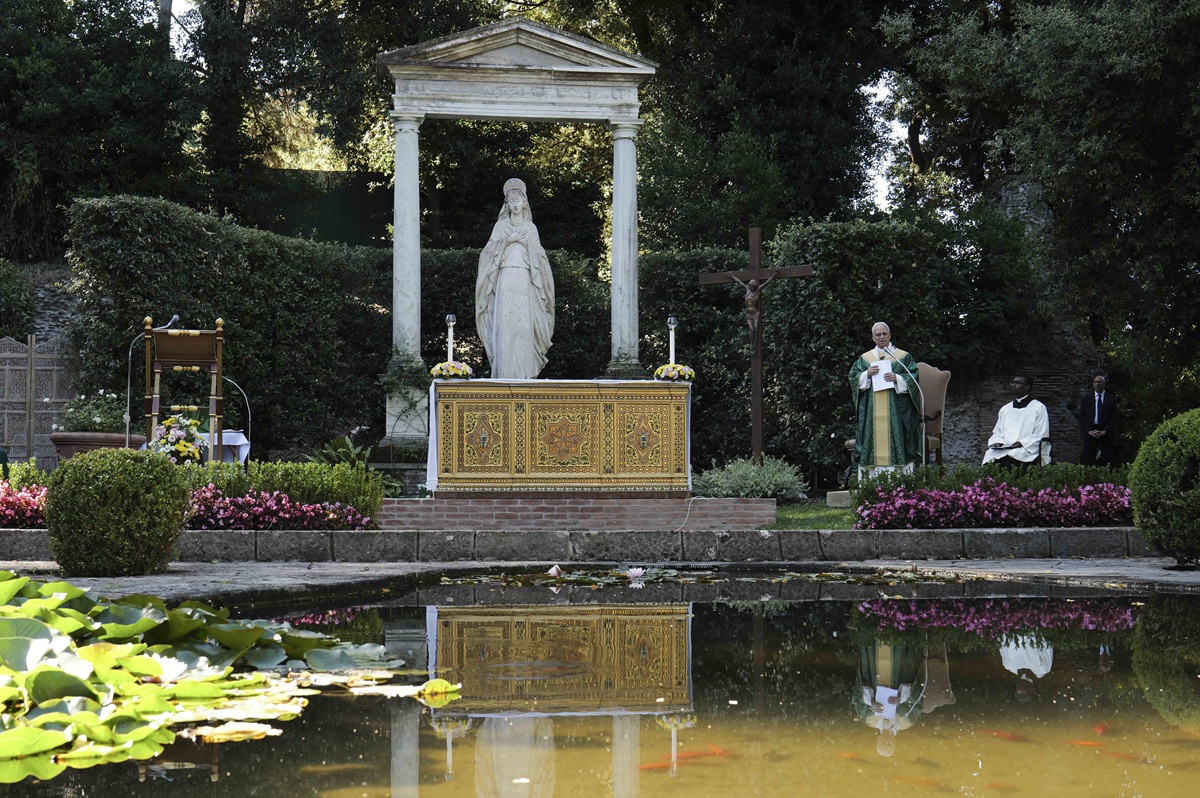Pope calls for prayers for those who fail “to recognise the urgency of caring” for creation
Leo XIV led an outdoors Mass in the gardens of Castel Gandolfo, the first public celebration of the Mass inspired in its liturgical texts by the specific intention of safeguarding the environment as our common home. The world is “ burning, both due to global warming and armed conflicts,” Leo lamented. “Our indignation is God’s indignation”.
Castel Gandolfo (AsiaNews) – Pope Leo XIV this morning celebrated the first Mass for the Care of Creation at Borgo Laudato Si’, a village at the papal residence of Castel Gandolfo, in the Roman hills, a "laboratory" for the “harmony with creation which is healing and reconciliation for us," the heart of the eponymous encyclical Pope Francis issued ten years ago.
“We have prayed for conversion, our conversion. I would like to add that we must pray for the conversion of many people, inside and outside the Church, who still fail to recognise the urgency of caring for our common home,” the pontiff said. “Many of the natural disasters we still see around the world, almost every day in many places, in many countries, are partly caused by human excesses, with their lifestyles. Therefore, we must ask ourselves whether we ourselves are experiencing that conversion: how much we need it.”
Today's celebration also marked the first public use of the Mass for the Care of Creation, the new formulary for a Eucharistic celebration with this specific intention promulgated in recent days in the Roman Missal by the Dicastery for Divine Worship and the Discipline of the Sacraments.
"Here," said Leo XIV, referring to the small lake in front of which the altar was located for the outdoor celebration, "it is like in the ancient churches of the first centuries, which had the baptismal font through which one had to pass to enter the church. I would not like to be baptised in this water... but the symbol of passing through the water to be washed clean of all our sins, of our weaknesses, and thus be able to enter into the great mystery of the Church, is something we experience even today."
In his homily, commenting on the Gospel passage about the storm calmed by Jesus (Mt 8:23-27), Leo referred to "a world burning, both due to global warming and armed conflicts, which make Pope Francis’s message in his encyclicals Laudato Si' and Fratelli tutti so timely."
The disciples' fear in the storm today “is that of a large part of humanity. But in the heart of the Jubilee Year, we confess – and we can say it many times: there is hope! We have encountered it in Jesus. He still calms the storm. His power does not overturn, but creates; it does not destroy, but brings into being, giving new life."
The pope then reflected on the astonishment of the disciples on the boat with Jesus, who asked themselves, “What sort of man is this, whom even the winds and the sea obey?”
"The wonder expressed by this question," Leo explained, "is the first step that frees us from fear. Jesus lived and prayed around the Sea of Galilee. There he called his first disciples to their places of life and work. The parables with which he announced the Kingdom of God reveal a profound connection with that land and those waters, with the rhythm of the seasons and the life of creatures."
This awareness – made even more complete by the encounter with the Risen One – means, for the pope, that "our mission to protect creation, to bring peace and reconciliation to it, is his own mission: the mission the Lord has entrusted to us. We hear the cry of the earth, we hear the cry of the poor, because this cry has reached the heart of God. Our indignation is God’s indignation, our work is his work."
This is why it is important for the Church to live out the protection of creation through a special Eucharistic celebration.
Leo XIV cited a passage from the encyclical Laudato Si' in which Francis wrote: “It is in the Eucharist that all that has been created finds its greatest exaltation. Grace, which tends to manifest itself tangibly, found unsurpassable expression when God himself became man and gave himself as food for his creatures.”
In concluding, the pontiff cited Saint Augustine, who, in the final pages of his Confessions, associates created things and man in a cosmic praise: “O Lord, [. . .] Let Thy works praise Thee, that we may love Thee; and let us love Thee, that Thy works may praise Thee’ (Saint Augustine, Confessions, XIII, 33, 48).”
“May this be the harmony we spread throughout the world.”
01/09/2016 14:05







.png)










